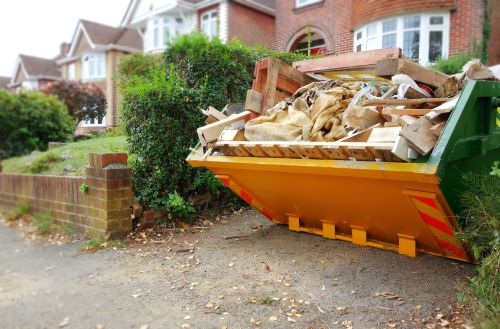A skip is a great way to get rid of a high volume of waste over a period of a couple of weeks and it makes sense to organise a clearout at the same time as tackling an improvement job like a bathroom refit or landscaping.
If you’re having substantial work done, your contractor will probably be happy to organise a skip and they’ll likely know where to get one for a reasonable price, but it’s not unusual for homeowners to organise waste disposal themselves.
Before hiring a skip, there are a number of important things to consider first, so we’ve addressed the most common questions below.
Where can I place my skip?
Make sure you have somewhere suitable to put it. Ideally, it will go on a driveway or front garden, but while skip lorry drivers are highly skilled, front walls and narrow entrances can mean that’s not always possible.
If you can get the skip on a driveway, avoid damage to tarmac or block paving by putting down planks or a large piece of plywood to sit underneath the skip and even out the load. Make sure you’re around to coordinate the drop off so you get the skip exactly where you want it.

How long can I have a skip for?
The standard hire period tends to be two weeks but the collection date can usually be flexible. If you need a skip for longer, ask when you book. They may charge extra or they may agree to extend the hire for no additional cost.
What can I put in my skip?
There are two types of skip for domestic waste – those for inert waste which is material like rubble or soil, sand and cement, and those for mixed waste which can be anything from builders’ waste to certain appliances, furniture, carpet, garden waste and other household junk. Mixed waste skips tend to be more expensive than skips for inert material as the process of separating, recycling and disposing of the waste is more complicated.
Remember, some items can’t go in skips and must be disposed of in other ways, usually at your local household waste centre or ‘tip’; these include liquid waste like paint, gas bottles, mattresses batteries, fridges and freezers, TVs and computer screens, fluorescent tubes and clinical waste. If in doubt, check with the skip hire company first.

What size skip should I get?
The smallest skips you can hire are generally two cubic yards, which will contain around 15-20 bins bags; they go up in size to 12 yards which is over 100 bags and around 8 tonnes in weight. It’s hard to know the right size to get but if you have any doubts, go one size up – there’s always more waste than you think and it’s better to have more room left than hiring another skip later.
Most skips have ‘Level Loads only’ written on the side and you should avoid overfilling if you don’t want to risk being asked to take items out or face extra charges. To pack your skip efficiently, place large and flat pieces of wood like doors or furniture along the sides of your skip and flat heavy items at the bottom. Avoid air pockets as that’s dead space, and if you plan to put garden waste in, save that for the end. It’s amazing how much room bushes and foliage can take up.
Get started on your project today
Get free quotes from experienced local tradespeople near you
Where does my waste end up?
The best skip companies recycle most of the rubbish collected and if they don’t operate their own, will take your waste to a waste transfer station where it is sorted. The material will either be recycled, sent to a waste to energy facility, taken to a landfill site or a combination of all three. If, like us, you care about the environment, ask the skip company about how much material is recycled; this is where cheaper companies might not be best and it’s worth paying a bit extra to know your waste isn’t mainly going into landfill.

